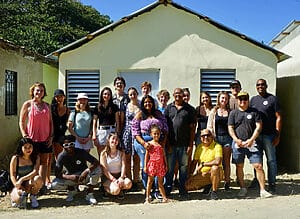Category: Locations
Great Expectations
[vc_row type=”in_container” scene_position=”center” text_color=”dark” text_align=”left” overlay_strength=”0.3″][vc_column column_padding=”no-extra-padding” column_padding_position=”all” background_color_opacity=”1″ background_hover_color_opacity=”1″][vc_column_text]

[/vc_column_text][/vc_column][/vc_row]
From the Ground Up
This week was our build week. Instead of a house build like LiveDifferent normally does, we decided to switch things up a bit and work on a schoolhouse project. This Build was very different compared to my other LiveDifferent Build experience. The school was built out of wood entirely and had two classrooms inside the one building. During the last day of our “Week in the Life” experience we had spread the dirt that the concrete pad was poured on. The concrete pad was spread and dried during the few weeks between Week in the Life and our build week. When we got to the site to actually start our build, there was just a pad on top of a pile of dirt.
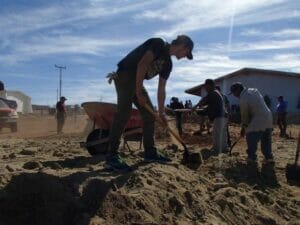
As the days went by, our Build slowly took shape. I had the most fun working on the roof, from snaking through the support beams to slathering on tar for the shingles. From on top of the roof I could see all the way out to the ocean and also could see the next town, Camalu. I could see the entire build site and watch everyone do their jobs. The part that I didn’t enjoy was painting. It was especially difficult because the wind kept blowing sand and dirt onto the walls we were trying to paint. But, in the end, it was all worth it because the school looks beautiful with its gray walls and white trim. During the week, we ran into some travelers from Tennessee and some circumstances led them to helping us for a day or two. It was so cool to meet these people and have them help with building the school.
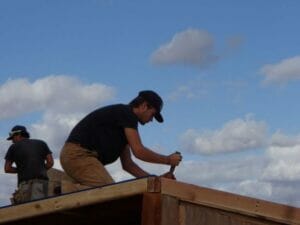
This was a pretty important Build, not just to me, but important to all the families and students who live in the surrounding area. The school that the students were using was four garage doors and a tarp as the roof. There was no flooring so the classroom floor was just bare dirt. When we got towards the end of our build, the students took down their old classroom, and seeing their faces of glee and excitement taking it down was indescribable. The build was a fantastic experience and it is such an amazing feeling to see the school all set up and see it wiz past as we drive down the highway.
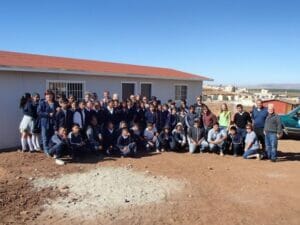
-George (Jorge), Academy Student 2015
Desert Adventures
For the last two and half months we have adventured to many different places that are reflective of the Mexican culture. A few of my favourites were a volcano hike, Lucha Libre, Globos market, and the Baja 1000 off-road race. All of these excursions were terrific outings where we met many kind people and experienced Mexican culture. The volcano hike was an interesting and smart way to view a new part of Mexico. We traveled to a lovely beach and, from there, hiked an hour up a beautiful volcano. The volcano has not been active for many, many years. Hiking up was a leg killer because it was all up hill, but reaching the top made it all worth it. The views were spectacular and breathtaking. There is something so mindful and peaceful about being on the top of a mountain and soaking in the beauty that Mexico has.
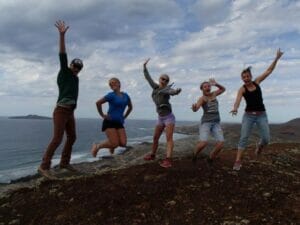
Lucha Libre is a form of entertainment wrestling widely enjoyed throughout Mexico. Mexican wrestling is characterized by colourful masks. The wearing of masks has developed special significance and matches are sometimes challenged where the loser must permanently remove his mask, which is a done with a high degree of weight attached. I am aware that this type of entertainment is a huge part of the Mexican tradition, which we haven’t seen a lot of. The wresting event that we watched was held at Globos, a market that is held every weekend in a nearby town, San Quintin. Many items are sold at the market including clothing, food, and toys. The owners of the market were celebrating their 10 year anniversary in business and to celebrate they hosted a Lucha Libre event. Many people gathered for this experience because it is a very popular tradition in Mexico.
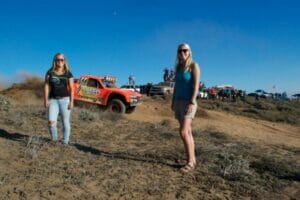
The Baja 1000 is an off-road desert race that takes place on Mexico’s Baja California Peninsula the third week of November every year. It draws in thousands of spectators, sponsors and media. We were able to participate in the Baja 1000 festivities by travelling to Ensenada for the pre-race fan fair and spending the next day watching the race on the track near our home. The Baja 1000 allows various types of vehicles to compete on the same course, from dirt bikes, atv’s, dune buggies, trucks, and custom fabricated race vehicles. The name of the event can be misleading as the mileage varies each year because the track changes, but essentially it is about 1300-1500km’s! You can imagine how long it must take! The racers who are able to complete the race usually finish in an average of 18-22 hrs.
All of these outings have been so much fun and have made the LDA experience so much more enhanced by participating locally with Mexican culture. With only three weeks left, I hope to attend more fun filled excursions in order to soak up more culture and knowledge about Mexico.
– Grace, Academy Student 2015
No Hombres? No Problem
This week I attended our different volunteer positions and visited my host family one evening. I really enjoy going to Buen Samaritano, because I like the work I get the opportunity to do there. I enjoy the reactions I get when I ask for the “man’s” job. Another female student, Danica, and I showed up one day, ready to mix concrete to set up some posts for a clothes line. We received a confused look and a ‘No hombres?’ (No men?) from the women in charge. “No, muy fuerte!” we assured her as we flexed our arms jokingly. She then led us to the lines and we worked for three hours mixing and laying concrete into meter deep holes. We finished 3 out of the 7 holes. Many people here have such a strong idea of what women and men’s roles are. In Canada, I have worked as a carpenter, a landscaper, and a construction worker, all of which are traditionally deemed jobs for men. A number of times I have gotten weird reactions, but I like to prove that women are just as capable of doing labour work as men are.
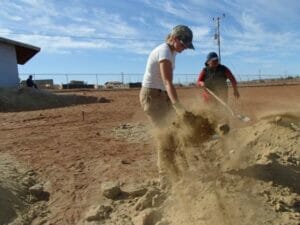
Mareena is another reason I like working at Buen Samaritano. She works there and it feels awesome to be able to connect with someone from the area. She speaks enough English that we can have conversations and she helps me with my Spanish. Mareena likes it when we tell her about Canada. Her questions are filled with wonder as we tell her about the weather and how different it is from Mexico. Getting to know her has definitely made this volunteering experience better.
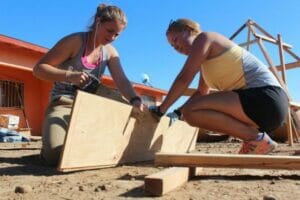
I have never been the socialite but I have really enjoy being with my host family. We visit them one evening a week, in order learn more about Mexican culture, practice our Spanish, and get to know other people in the community. I love preparing dinner together, joking around, and laughing about our miscommunications. Dinner is great and the food is amazing, so I always compliment Hilda on her cooking. She is so funny; she will point to my stomach and say “nada!” (nothing) and then grab her own and say “manteca!” (fat) – she thinks I’m too skinny. We laugh about this exchange because it happens every time.
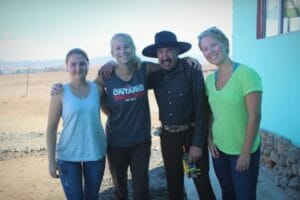
LiveDifferent’s motto is, “Life is about people”, and I’m beginning to see what this really means by taking in people’s stories and getting to know their personalities. It’s such a powerful feeling to really get to be a part of a person’s life, and to impact them in a way that you could not have if you hadn’t taken the time to build these relationships. Sharing moments and memories with others is something I’ve learned is so important. Life really is about that special connection you share with everyone who enters and exits your life.
– Alexandria, LiveDifferent Academy Student 2015
Time – An Undervalued Luxury
This week was very challenging, but also very rewarding. I was able to learn so much about poverty and about those experiencing poverty that I’ve never thought about before. One of the hardest things I learned this week is how little free time people have to spend with family and friends. There is always something to do. What do you do after you are done work for the day? Typically, one would go home, make dinner, do a couple chores, and then relax until bedtime. What if simple things like cooking becomes a chore or a challenge? The reality for some people is that they have to continue working hard as soon as they get home. They need to cook, some over an open fire, to make repairs to their homes, do yard work, laundry, and so much more. It’s crazy to think that after people work a 9 hour day in the sun in the fields, or rock picking, they have to come home and do more hard work. Back home, when I finish a day of work I come home and watch TV or sit and hangout with my family. Understanding this is also a reality for many working people back in Canada too, it made me realize just how lucky we are to have some of the luxuries at home that make those daily chores less stressful and time consuming.
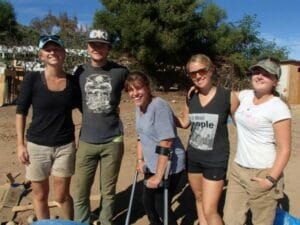
No task is simple when living in these conditions. For example cooking is much simpler when we have a stove, countertop, and numerous cooking utensils at our reach, but for many people, and for us this past week, we were cooking over an open fire. It is hard to imagine that food can be an uncertainty in people’s lives. If it is raining, then the fire won’t start, which means you’re unable to make dinner for your family. Living in this uncertainty this week was a new concept for me. It made it very stressful and made me anxious every time we were about to cook. Throughout the week our timing with cooking food improved, as we always tried to get most of the cooking done before dark. It is amazing how much you can’t do once it starts to get dark. Again, it is a totally new concept as I have always lived with electricity.
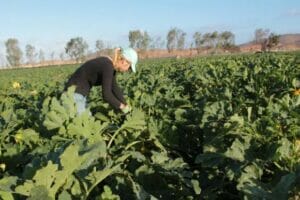
This week has taught me so many things and I am beyond thankful to have gotten to experience it all. One of the largest lessons I learned is to never underestimate one person’s ability and strength. Working alongside locals this week and getting a taste of what their everyday lives showed me how strong people can be. While we were working alongside them we needed to take breaks, to drink water, and give our bodies a chance to stretch, but they do not take these breaks and continue working for long periods of time. They know what they need to do to provide for their families and they are willing to do it. One of my favourite moments this week was when we were rock picking on Friday. After we worked for about 5 hours in the sun, we were done picking but now needed to bring up all the bags of rocks. At this point the workers became less serious about getting as many rocks as they could and starting joking around with each other and talking more with us. It was nice to see that even after a long workday they were able to joke with each other and try to make their days more enjoyable.
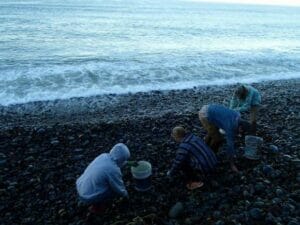
I have found a greater respect for those experiencing poverty, especially those we were able to work alongside. I am very grateful we had this opportunity to try and understand some of the daily challenges they face. We learned so much this week about our group, poverty, and ourselves in general.
– Danica, LiveDifferent Academy Student 2015
The Most Empowering Week of My Life
Being empowered doesn’t come from things that come easy to us. It comes from the tougher times where we push ourselves to the limits and survive to tell the story. That’s how I feel about this experience.
Everyone else was so excited for ‘Week In The Life.’ I, on the other hand, was terrified. I didn’t sleep at all the night before we moved in or the first night outside of our normal bunkhouse either. I was living without walls and I wasn’t sure I could do it. But I have.
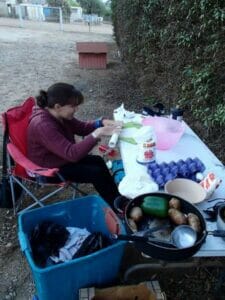
With a few changes, I’ve still been able to live this experience with everyone else. Though I helped with the building of the house, I don’t sleep there. I sleep in a room, on a concrete floor, with all the windows open. I have a mattress and a plastic chair, which are the only things that the others don’t have. No electricity. No running water. We all cook meals over the fire. It’s not an easy life to get used to.
We were all talking around the fire last night about the things we missed the most. The item I said I wish I had was a lamp. Just to be able to read at night is a luxury I definitely take for granted. The food item I wanted more than anything was peanut butter. Seems simple enough, right? Well, you’d be surprised how expensive it is for a family of 5 who are living on the income of one field worker! I’ll never look at it the same way again.
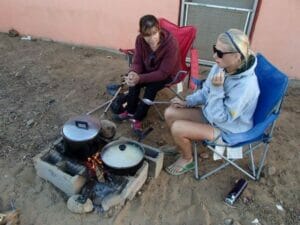
Showering is very different also. Though I find bathing with just a bucket challenging, it does raise a startling point about water usage. We as Canadians use far too much. To know that I can wash my hair and my entire body with just one bucket of water is shocking because I know I use far more in a shower with running water whether I mean to or not.
But the best thing that has come from this experience is that I feel it has made everyone better friends. In order to be successful in an environment like this, you have to be able to work together and function as one unit. I think we have done pretty well at doing just that. Personally, I have had to become better at acknowledging what I can and cannot do and ask for help. I am not usually good at that, but during this time I’ve had no choice. I’ve also had to do different types of work than the others would do. There are times I wish I could be in the fields working with them, but at the same time I like doing different work because I enjoy when we share our stories about our day once we’re all together in the evening again. It makes the experience all the more interesting.
Is this a way I would want to live for an extended period of time? No. But I have realized that the people who do live in these circumstances are extremely courageous and strong. After walking a mile in their shoes, no better words could be said. My frame of mind has been forever changed by this experience.
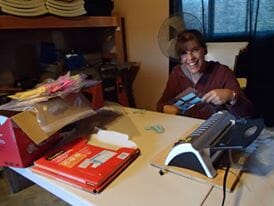
– Melissa, Academy Student 2015
A Positive Look at Challenges
Planning for Week in the Life, learning what it was about, and trying to think of ways to prepare for it, was all very exciting. However, now that we are actually a part of the experience, we have a totally new mindset. So far this week we have learned new cooking skills and how to work in the orchard and in the fields. The first day we had it pretty easy, moving into our house, cooking and setting up around home. Monday was harder, adding work at the orchard to chores and cooking was rough. Our work included cleaning up debris and leaves, and watering the trees. A seven hour day, working in the hot sun was exhausting, and then when we got home we had to do maintenance on our house, grocery shopping, and cooking. It made us realize the work people have to do every day to make little money and keep up their living spaces.
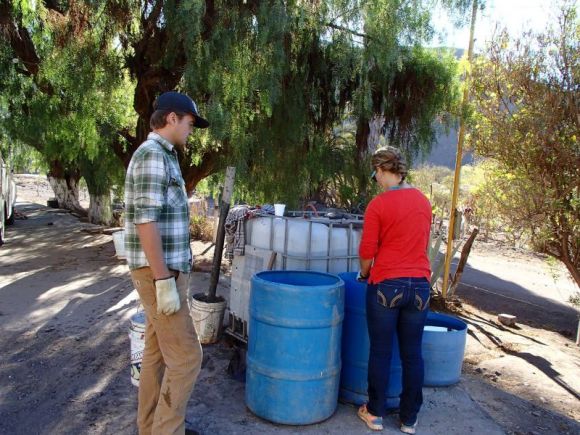
Monday night was a tough one. It rained a little bit, getting many of our things wet, including our firewood and matches. So on Tuesday morning it took us a long time to get the fire started to refry our beans for lunch. With no time to walk to the bus, we had to pay for a ride. It was not the best morning, but it is all part of the experience and learning about daily challenges that arise when you don’t have access to electricity, a stove, or a secure shelter.
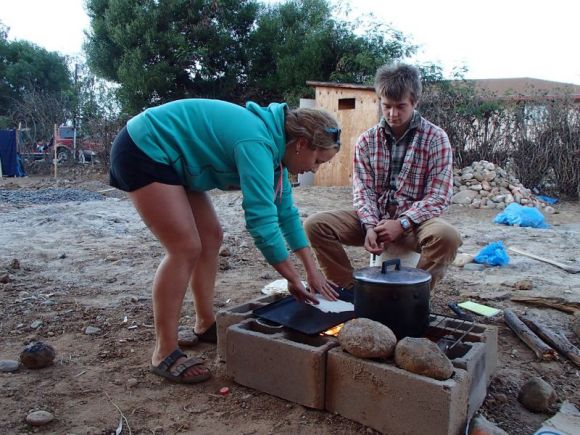
Our work on Tuesday was at a local farm picking strawberries. Because the bushes were not mature, there were not a lot of berries to pick. Thankfully, when it’s like this the farmer pays each worker by the day, not by the case of strawberries.
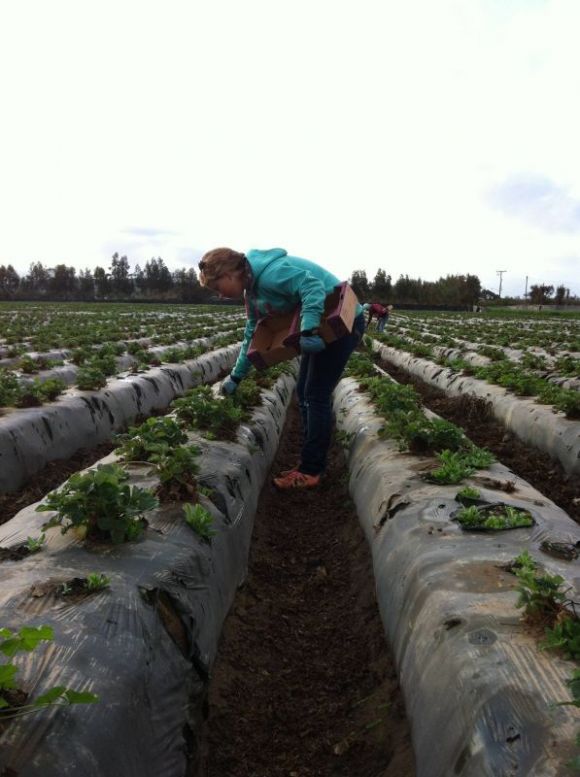
Within these first few days we have learned a lot about ourselves, each other, and life. It is the people around you that help you out when times are tough. We recognize that we all need to stay positive and determined and we can learn a lot through this experience. With this in mind, I came to the realization that every outhouse is going to be gross so I might as well get over it. I also understand now that when I am at home and my mom comes home from work and I say “What’s for dinner?” that I’m not being fair to her because she’s been working all day. It’s very tiring to go to work and then come home and continue working around the house. I commend the people here who wake up before the sun and labour in the fields all day. I also admire the people at home, in Mexico, and elsewhere in the world that put in a full day of hard work, return home and find the energy to raise a family and maintain a household.
– Grace, LiveDifferent Academy Student 2015
We learn from one another
We had our first full week of volunteering and I felt it went really well. We volunteered at various organizations including Casa Hogar Ebenezer and Buen Samaritano – old age homes, Oasis – an after-school program, Welcome Home – a daycare, New Beginnings- a women’s shelter, and we taught English and an art class at a local school and a community center.
Throughout the week I really enjoyed teaching English at the Chula Vista Community Centre to kids in grades 1-3. Our class has about 15 children in it and more are joining as the class is becoming known in the community. It is an incredible experience to be these children’s resource to learn a new language. The ability for them to speak and understand English can open up numerous possibilities and opportunities in their lives. It is, however, extremely challenging, as I am not a teacher and have never taught English to anyone. We were lucky to have an English teacher in Canada devise a beginner program for us and then send a woman down to Mexico to teach us in person. Even with the program, it is difficult but we are all learning together and from each other as well. My highlight from our first class was when the children started to catch on to the sounds and letters we were trying to teach them. It is very rewarding hearing the children speak in English even though its only one small word. Seeing them starting to understand it is an incredible experience.
I had a great personal experience at Buen Samartiano. We got to work closely with the seniors and it was really nice to help them out in any way that we could. While we were there, Ally and I were painting the women’s fingernails. There was one woman who I had a strong connection with. While painting her nails, she was telling me all sorts of stories, which I couldn’t understand since they were in Spanish. I did my best and smiled and laughed when it was appropriate and she got noticeably happier as our time continued. It is amazing how happy this woman was to have someone listen to her stories and to share laughs with, and I was happy to share that with her too.
After this first week of volunteering I am very excited for what’s to come within these next few weeks, as we continue to strengthen relationships where we volunteer and with the people in the community.
~ Danica, LiveDifferent Academy Student, 2015
A Glimpse of What is to Come
During our first week back in Zapata, after Spanish school in Ensenada, we spent most of our time visiting all the volunteering locations and learning about their history and mission. We visited a few afterschool daycares – Oasis, Welcome Home, and Chula Vista Community Center; a couple old age homes – Buen Samaritano and Casa Hogar Ebenezer; and a Women’s shelter called New Beginnings.
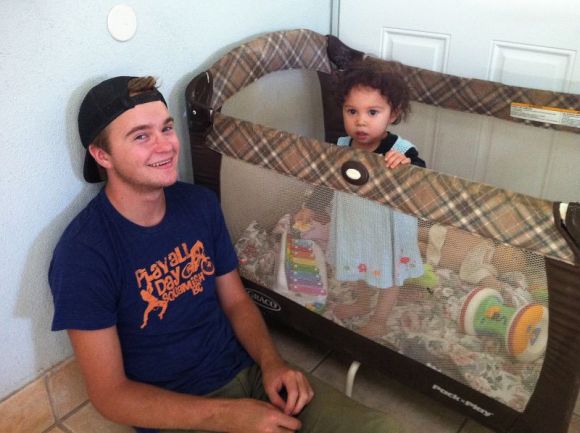
Visiting these places was an experience of their own. Each place was so welcoming and passionate about the organization and willing to talk to us about the struggles and path they had to take to create the organization. It felt as if we were entering a bundle of both positive and negative emotions when we listened to the stories of the creators. We were very excited to meet the founders of these organizations and they were excited to meet us and have us help them with their daily activities.
One NGO that stood out to me was the women’s shelter. We met Dorothy, the founder of New Beginnings, and we listened to all the empowering and somber stories of the women at the shelter. Many of the women have been involved in the sex trade or were victims of abuse and neglect. The shelter was set up to help these women rediscover themselves and learn skills such as sewing, cooking, and child care. They fundraise for the shelter every weekend by selling jams in three different flavours: Mango, Strawberry, and Mixed Berry, and mixed in are Jalapeño peppers to make a very sweet, spicy and delicious jam, a treat they graciously shared with us.
This week was a great experience, listening to all the stories, and we are all excited to start volunteering next week.
– George, Academy Student 2015

